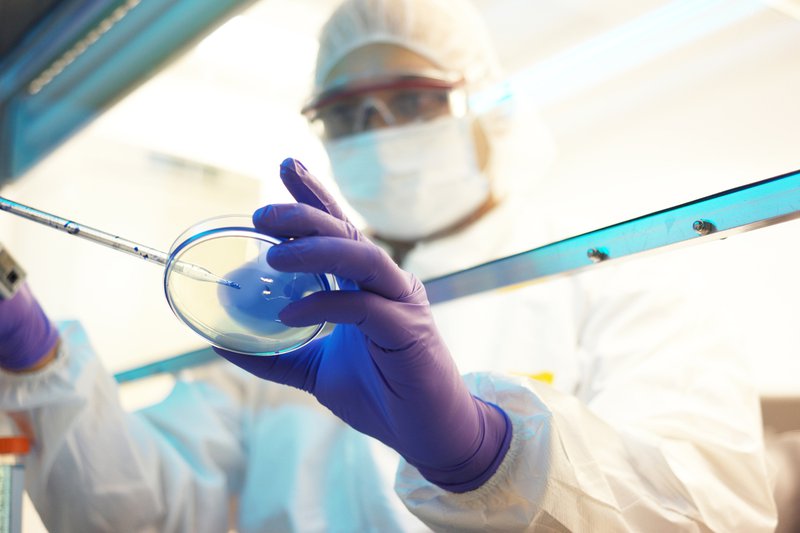
By Andrew Dunn
March 9, 2020
- As the coronavirus outbreak has exploded into a global public-health emergency, leading drugmakers have begun researching treatments and vaccines to stop the virus.
- The small biotech Moderna has leaped to the front of the race, with its vaccine candidate ready to begin testing in people. Pharma giants like Johnson & Johnson and Sanofi are also in the early stages of developing potential vaccines.
- There's no assurance the vaccines will work. It will take at least 12 months to 18 months to determine if these experimental vaccines are safe and effective against this coronavirus.
- That leaves a near-term need for treating those already sick. Other drug companies have been looking to repurpose antiviral drugs as a way to treat COVID-19, the disease caused by the virus.
- Gilead Sciences is leading those efforts, with trials underway for an antiviral drug called remdesivir. The World Health Organization called it "the most promising candidate" to treat COVID-19. The first results are expected in April.
- The virus' rapid spread has instilled urgency in developmental efforts, which are set to test how quickly these companies can identify and mass-produce effective treatments.

Multiple drug companies are working with US health authorities to develop treatments for a coronavirus outbreak that originated in Wuhan, China, and has now killed more than 3,400 people and infected upwards of 100,000.
The companies — including giants like Johnson & Johnson, Sanofi, and Gilead Sciences — are taking a variety of approaches. Some are hunting for near-term treatment options, either by testing existing drugs or investigating new antivirals or antibodies. Others are developing vaccines using info about the virus' genetic code.
While drug development is typically a multiyear process that faces significant hurdles, US health officials have been pushing speedy timelines. Anthony Fauci, the director of the National Institutes of Health's (NIH) infectious disease center, said he hoped to start testing a vaccine candidate in humans by April.
That urgency stems from an outbreak that has been declared a global public-health emergency, roiled stock markets, and has spread to several dozen countries, including the US.
Here's how nine leading drugmakers are attempting to fight the virus.
Moderna leads the vaccine race, with human trials set to start by April
The biotech Moderna is testing a new technology platform against this public-health threat.
Moderna went public in 2018 based on the promises of its novel genetic approach to therapeutics. And under the pressure of this outbreak, Moderna has responded in record time.
The company used its platform, called messenger RNA, to develop a vaccine candidate with financial support from the NIH and the Coalition for Epidemic Preparedness Innovations.
The first batch of its coronavirus vaccine has been shipped to NIH officials, who will lead the first clinical trial. NIH officials have said testing should begin by mid-April, leading to initial human safety data a few months after that. Later tests will require hundreds or thousands of people and will look to see if the vaccine can stop the coronavirus.
Gilead Sciences has 'the most promising candidate,' WHO says
The California biotech Gilead is repurposing a drug called remdesivir that was previously tested against Ebola. The WHO has called the antiviral "the most promising candidate" for a treatment against COVID-19, the disease caused by the coronavirus.
A case reported in The New England Journal of Medicine initially stirred excitement about the potential of Gilead's drug. Gilead also said the drug has shown activity in animals against similar viruses.
Company executives and health officials have stressed the need to wait for clinical results. Those findings will come quickly though, with Gilead execs expecting the first data in April.
If successful, Gilead CEO Daniel O'Day said the biotech has begun to invest in manufacturing to be ready to distribute remdesivir quickly.
There are five planned clinical trials in China and the US for remdesivir, with three actively enrolling patients. The final two studies are late-stage trials expected to start later in March that Gilead will run.
J&J is aiming for vaccine trials to begin in late-2020
The largest healthcare company in the world is leaning on its size and experience to make a difference.
J&J is currently testing several versions of a vaccine in animals, which has brought "positive results," said Paul Stoffels, the pharma's chief scientific officer, at a March 2 White House briefing.
Stoffels said he hopes J&J can start testing a vaccine in humans by November 2020, leading to the first safety results in early 2021.
While that testing is underway, he added the company can simultaneously produce large quantities of the vaccine.
Sanofi is looking to build on top of SARS vaccine candidate
Sanofi is also working on tweaking a vaccine candidate first developed for a different coronavirus in the 2002-2003 SARS outbreak.
But the French pharma's timeline is slower than some of the other approaches. The company plans to start clinical testing in a year, said John Shiver, Sanofi's senior vice president of global vaccine R&D.
While it may take longer, the $120 billion drugmaker also has the capacity for mass production. Shiver said its manufacturing plants in New York and Pennsylvania could make 100 million to 600 million doses per year and not jeopardize its flu vaccine production.
Regeneron is pursuing 2 routes to find a coronavirus treatment
Regeneron and the US Department of Health and Human Services on February 4 added the coronavirus to an agreement to develop antibodies against the leading public-health threats.
With that expansion, the biotech-industry leader has started its efforts to counteract the virus. Regeneron CEO Leonard Schleifer said the antibody approach can move along more quickly than vaccines, given the cautiousness required to make sure a vaccine doesn't make the disease worse.
Regeneron is currently screening about 1,000 antibodies sitting in petri dishes, Schleifer said. It is exploring the potential for a treatment that could fight the virus in those already affected as well as to protect those that aren't infected from the virus.
The New York biotech plans to select an antibody, scale up manufacturing, and start testing it in animals this spring and summer. By late summer, Regeneron is aiming to begin testing that drug in humans, with the capacity to produce 200,000 doses per month by August.
Pfizer jumps into the fray, testing antiviral drugs
Pfizer shared the first glimpse at its early research at the White House briefing on March 2, attended by the big pharma's Chief Scientific Officer Mikael Dolsten.
The drugmaking giant has completed preliminary screening of antiviral medications that were already under development. It expects to finish the screening process by the end of March, tapping an undisclosed third party to speed up that work.
If that process is positive, a potential drug candidate would still require toxicology studies before beginning in-human testing. Pfizer hopes to be in the clinic no later than the end of 2020 with any potential drug candidates.
The New York drugmaking giant is also considering working with a German biotech called BioNTech to develop an mRNA vaccine for the coronavirus, Reuters reported on March 5.
Alnylam and Vir team up in expanded RNAi partnership
While the mRNA platform is being applied for a vaccine, a similar genetic technology is now being researched as a therapeutic approach.
On March 4, Alnylam Pharmaceuticals expanded a collaboration with San Francisco-based Vir Biotechnology to use its RNA interference (RNAi) platform against COVID-19.
An mRNA vaccine aims to create a protein — RNAi is geared to knocking it down. Alnylam leads the RNAi space as the only biotech with approved drugs, notching its first approval in 2018.
An RNAi therapeutic could be used in patients at high risk of being infected, such as healthcare workers or family members of an infected person, Alnylam CEO John Maraganore told Business Insider in a March 5 interview. This is because RNAi drugs typically take a couple of weeks to reach peak effect, he added.
The research is still very early, with the companies not yet having announced a timetable for selecting a leading drug candidate or starting human trials.
Takeda looks to recovered COVID-19 patients to help others
Japan's largest pharmaceutical company is reviewing its own pipeline for potential treatments, while researching the possibility to use the blood of COVID-19 patients who have recovered from the disease, the company said on March 4.
The novel approach will be a hyperimmune globulin called TAK-888, which is effectively blood plasma containing high levels of an antibody. It will require close coordination with global health authorities, as Takeda will need to obtain plasma from people who have successfully recovered from COVID-19, according to the company.
The donor blood, when transferred to a new patient, could fight the virus and boost an immune response since it already has the antibodies against the virus. This will likely be a formidable challenge to move quickly, as the company stated this plasma is unlikely to come from current donors.
Small biotechs say they're working on vaccines too, but they lack the resources of bigger firms
With more than 500 publicly traded companies, the long tail of the biotech industry has also gotten involved in developing treatments against the coronavirus.
These companies typically haven't brought any drugs to market and have significantly limited resources compared with industry-leading pharma and biotech companies, particularly in terms of their ability to run trials in many people or manufacture vaccines or drugs.
In addition to Moderna, CEPI is also working with and awarded funding to vaccine development efforts by Inovio, a small Pennsylvania biotech, and CureVac, a German drug developer also looking to advance an mRNA vaccine.
Inovio's CEO said the company aims to start human testing in April, while CureVac has guided to starting trials in June.
Subscribe to Business Insider's Financial Insights Newsletter
This Business Insider article was legally licensed by AdvisorStream


